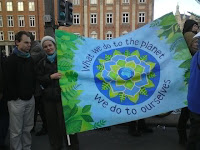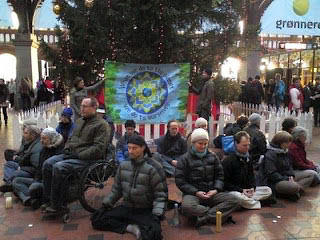
Today’s post is from Yogaratna, an Order Member and environmentalist from Cambridge UK, recently returned from the climate change conference in Copenhagen. We’re hoping to bring further reports later in the week from the FWBO’s
EcoDharma centre in Spain, many of whose community also attended.
Yogaratna writes -
“From London it was £485 by rail, and about £18 to fly. Luckily I have the money, and I like train journeys.
“A blue sky, a big main square stuffed with thousands of people, clever banners, funny costumes, performances, dance music: a party atmosphere. I met up with some Gaia House Buddhists, and marched with their banner, which said: “what we do to the planet we do to ourselves”.

“I found it moving to be around thousands of people, all passionately wanting a positive response to climate change. A few hours later there were some angry speeches, lots of police started blocking off streets where I was; and I ran away to get my train home.
“Many people (including myself) think nowadays that it seems unlikely that we can avoid runaway climate change. So why did I bother doing 44 hours of train travel, to be in Copenhagen for 8 hours? And what has all this frankly very political stuff got to do with Buddhism?
non-harming, and not taking the not-given
“For me it comes down to the first 2 precepts. Non-harming; but in particular not taking the not-given. I think it is in principle unethical to deprive any human of the basic necessities of life, especially in terms of food, water and shelter - but also education and healthcare. Ethically speaking, I don't think that we in the West have a right to our higher standard of living, which depends on a greater share of the world's natural resources. Our relative wealth (in global terms) depends on economic and military power, not metta or wisdom.
“It's increasingly obvious that the world's resources are very limited, that we rich are maintaining our lifestyle at the expense of the poor - and that climate change will make this dynamic much worse. Reading about the Copenhagen climate negotiations, I'm struck by the extent to which the wealthy countries have given up humanist posturing, and got down to power politics. The rich countries seem to be saying to the developing countries: we accept that we are on course for runaway climate change (which was caused mainly by ourselves), we are prepared to do almost nothing to reduce our greenhouse gas emissions, we believe you will die in very large numbers; here's a bit of money.
a time of great reality - and great surreality

“Copenhagen seems to have been a time of great reality, to the extent that people from all over the world did meet each other and talk on this issue, even (perhaps especially) at complete cross-purposes. But also a time of great surreality. The policing mirrored the talks, targeting official delegations inside the conference centre as well as demonstrators outside. At the same time, I would guess the politicians themselves are probably more genuinely concerned about (and knowledgeable about) climate change than the general public. They know that Copenhagen was probably the best chance of avoiding runaway climate change, and they don't dare to support measures which the science demands, but which would be unpopular.
Hopenhagen - or a corporate-sponsored narcotic?
“And in the streets of Copenhagen, the Hopenhagen posters. An advertising campaign instigated by the United Nations, essentially a positive idea (build hope for the Copenhagen conference) - but what about the corporate sponsors? One of them is Coca-Cola; a role model for doing virtually nothing on climate change. So the real message of Hopenhagen advertising is narcotic: we're nice people because we hope, it's OK to carry on sleeping and doing nothing; have a coke.
what would the Buddha say?
“So how about Buddhism? What would the Buddha say about all this? I'd love to know. I can't help thinking that he'd be surprised at the lifestyles and carbon footprints of most of his Western followers. Surely we'd seem incredibly wasteful and materialistic to him - and selfish too? Or would he say: don't bother your head with global politics, the best thing you can do is get on with your meditation and teaching at local level.
“I like to think that if the Buddha were alive today he would be concerned about global politics, because of their effect on human suffering - and even that maybe he'd be a figure somewhat like Dr Ambedkar. Of course, in his own lifetime, the Buddha talked to everyone; to beggars, but also to kings and their ministers. Arguably, the Buddha was very influential and probably wanted to be, both socially and politically.
“Of course, I'm neither the Buddha nor Dr Ambedkar; I'm just a pebble on the beach. But I want to live ethically; which is why I work to reduce my personal carbon footprint, and give some time to promoting awareness of this issue. Maybe we tend to underestimate the consequences of our actions. I think, or maybe feel, that our actions spread a long way into the future. Particularly at a time when so little is being done, every action against climate change now might be surprisingly and materially important to people in the future”.
“Overall, Copenhagen seems to me very poignant. It's as if the West would love to persuade itself that it does care, but knows it doesn't really. Like an alcoholic who thinks he should give up, but knows he won't. But even that's just one part of the story: personally I came home feeling very inspired by the people I'd met. And each year the anti-climate change movement is growing, all over the world. Within the FWBO there is much excellent work being done towards a more sustainable world; the
EcoDharma retreat centre and living situation in Spain particularly stands out for me.
Yogaratna, December 2009Labels: eco-dharma, engaged buddhism









 rss
rss